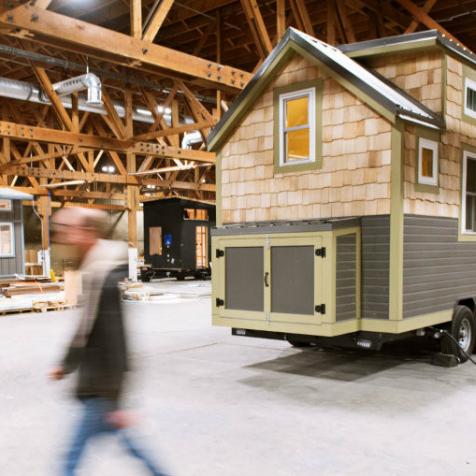
Company Details
Location
Pueblo, Colorado
Founded
2013
Ownership Type
Public
Employees
41
Products
Tiny homes
Pueblo, Colorado
Founded: 2013
Publicly traded (OTCMKTS: STHI)
Employees: 41
Industry: Built Environment
Products: Tiny homes and modular housing
"Chief Sproutologist" and CEO Rod Stambaugh is tackling affordable housing in Colorado's high country and beyond with tiny homes.
When Sprout Tiny Homes expands its 45,000-square-foot manufacturing facility to 126,000 square feet, it will be able to make about 15 tiny houses every week.
That's critical to the success of the company, which in December 2017 inked a $26 million contract to manufacture up to 275 tiny homes to be purchased and installed at two tiny home communities in the Austin, Texas, area. The first homes will be delivered toward the end of the month.
The company, which doesn't sell directly to consumers, serves three distinct markets; the single-family development community; workforce housing; and the overnight resort market.
"There is a ton of interest from very large developers that have come to us and like what we've done," says Stambaugh. "We've proven that we can deliver and scale."

In 2017, the company built six homes for Aspen Skiing Co. to test the concept for workforce housing. Each tiny house accommodated two people. It was so successful that the resort operator asked Sprout to build another 34 homes with each housing three people. "They're still about 1,000 beds short for their workers," Stambaugh says.
A few years ago, Sprout Tiny Homes purchased 19.5 acres along the Arkansas River in Salida, where it plans to build 200 tiny homes that will rent for $750 to $1,400 a month, including utilities. The company is building 96 storage units, two public parks, walking trails, a restaurant, clubhouse and fitness center in the community. The first tiny houses should be available by fall 2018.
"There's not a lot of housing available in Salida," Stambaugh says. "All of the available inventory has been purchased by investors who rent it out."

Sprout Tiny Homes also built 11 homes in the WeeCasa tiny homes resort in Lyons. Those tiny homes are designed a little differently than those used as permanent residences. The kitchens are not as large, the refrigerators are not full size, and they may not have ovens.
Sprout Tiny Homes is recognized as a leader in the design of tiny homes. The tiny homes in Aspen, for example, have infrared radiant floor heat and are extremely energy efficient.
"When you come off the ski slope to your tiny home, you can take your boots off and your floors are warm," Stambaugh says. "We've invested a lot of money in technology and the design of our homes. Our lofts have the highest headroom in the industry. In designing a tiny home, every square inch of space has to be functional."

Challenges: Zoning and building standards have been the biggest obstacles Sprout Tiny Homes has had to overcome but as more cities and counties gain a better understanding of what a tiny home is, codes are changing and making it easier the company and others like it to find property that can accommodate tiny homes for full-time residential use.
In late 2017, "El Paso County passed a land-use code and zoning that now allows a tiny home to be placed anywhere in unincorporated El Paso County and be lived in as a permanent residence," Stambaugh says. "Before, they didn't know what a tiny home was. They looked at it as an RV, and you can't live in an RV."

Opportunities: The lack of affordable housing in Colorado's mountain communities is one of the biggest opportunities that Stambaugh sees for Sprout Tiny Homes.
Needs: As Sprout Tiny Homes grows, it's imperative for its supply chain to keep up with it. "This industry is starting to grow, so our suppliers need to scale and grow, too," Stambaugh says.
The company also needs economic development officials to gain a better understanding of how tiny homes can help provide affordable housing in their communities. "You really have no chance of fostering any kind of economic development in your community unless you solve your housing crisis first," Stambaugh says.

